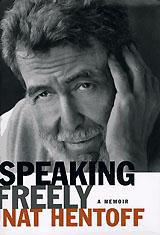
Hentoff's passion still burns
|
This review first appeared in the American Reporter in 1997.
Nat Hentoff still feels the rage.
In his latest book, "Speaking Freely," Hentoff quotes columnist Tom Wicker writing about I.F. Stone, the iconoclastic firebrand journalist of the '60s and one of Hentoff's heroes: "What keeps on energizing Izzy is that he has never lost his sense of rage."
He expands on Wicker by writing of himself that he has "always been attracted to the perennially indignant chroniclers of our time."
Well, put Hentoff down as being among the best of that breed – a sadly dying breed at that.
This latest book, for instance, is purportedly a memoir from the longtime columnist for the Village Voice, former editor of Down Beat magazine and impassioned defender of the First Amendment – yet in picking up where his first memoir, "Boston Boy," left off, Hentoff not only covers the last 40 years of his life but uses the opportunity to continue raging against hypocrisy and injustice.
Having once marched in protest of the Vietnam War and alongside the civil rights activists, Hentoff today takes on equally unpopular causes: Defending death row inmates. Arguing for the free speech rights of Klansmen and pornographers. Demanding justice for Palestinians and civil rights for handicapped newborns. And, most damningly to many of his former allies, passionately articulating the cause of the unborn.
It is this last stance, arrived at, he writes, during research for a story about doctor-prescribed euthanasia of handicapped babies in the early 1980s, that has most estranged Hentoff from the establishment Left.
He writes about his measured opposition to abortion somewhat wistfully; an obviously bewildered Hentoff points out that he no longer calls himself a liberal – that, indeed, like his beloved Duke Ellington, he no longer uses any political label to describe himself. Hentoff, raised and come of age during the glory years of American liberalism, when the Left was big enough to accept meaningful dissent – when, indeed, the Left not only thrived on dissent, but embodied it, even demanded it – is clearly disoriented by the viciousness of the attacks on his conscientious objection to abortion, of the efforts to silence him, of the active denial of his very existence simply for daring to disagree. He writes of being shouted down on campuses where he's talking about free speech, of being uninvited to speaking engagements because of his position, of former colleagues and friends refusing to even acknowledge him.
But if his fiercely independent stance on abortion is his latest brush with heresy, it is certainly not his first. During the '60s, Hentoff managed to alienate both the establishment Right then in power – by his outspoken opposition to our military presence in Vietnam and his public support of the Civil Rights movement – as well as much of the anti-war movement – by his condemnation of anti-war violence, violence that led to a lab worker being killed in a bombing, violence that he condemned as strenuously as he condemns anti-abortion violence today.
And Hentoff also made himself into a pariah when, as a prominent secular Jew, he criticized the Israeli government's treatment of Palestinians within its borders.
What all this makes Hentoff is a rarity: Someone with a finely developed and consistent ethic who will speak his conscience publicly, clearly, no matter who chooses to take offense.
Then there's the jazz. Before he was a civil libertarian, before he was a political columnist, Nat Hentoff was a jazz writer. His liner notes and books on jazz have been among the most cherished by music fans – he is in a class with Stanley Dance, Leroi Jones (Amiri Baraka) and the late Leonard Feather as among the greatest chroniclers of the Jazz Age. Even Nat Hentoff can't write about Nat Hentoff without a huge dose of jazz.
Hentoff delights in using anecdotes from his favorite musicians to illustrate a philosophical point, to make a statement about life's absurdities and joys. There are snippets about many of his favorite artists: Lester Young. Duke Ellington. Count Basie. Billie Holiday. Jo Jones. He writes of his days as a teen-aged disc jockey at a Boston radio station, of hanging out at jazz clubs after hours, of his experience working on an early television live performance, "The Sound of Jazz." Throughout, an absolute love of and immersion in the music come through. Surely, jazz has been the soundtrack to Hentoff's life.
Hentoff's writing is not particularly lithe; his prose will never be confused with Camus', for instance. But in his plain construction and straight-forward descriptions there is a simple elegance, a kind of grace through honesty that Hemingway would have appreciated.
What Hentoff conveys with that writing of his in "Speaking Freely" is a lifelong love of the unexpected, the journey of an intellect that has never ceased searching for new discoveries. It is the story of a man who will not be boxed in by others' expectations, nor limited by their fears and hates.
In short, Hentoff's is the voice of the joyful iconoclast who keeps all of us that much more honest for his discomfiting questions.
